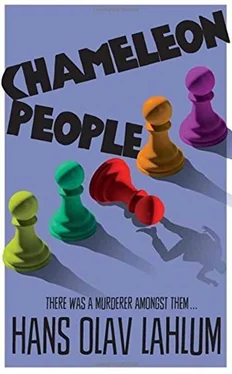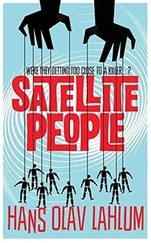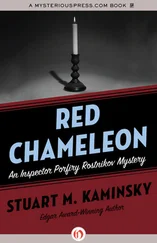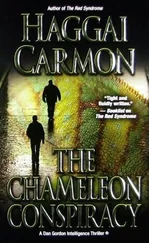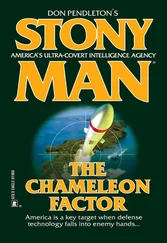I felt relief surge through my body as I listened to Danielsen. It was clearly the interpreter, and fitted well with the assumption that they were looking for her – and that in turn fitted well with the scenario that Patricia had outlined. When Danielsen stopped talking, I could still hear her voice in my head.
I stood there with Danielsen in front of my eyes and Patricia’s voice in my ears, then together we walked pensively over to my boss’s office and asked him if we could come in for a minute. I told him the main points of Patricia’s reasoning – without of course mentioning her name.
We sat there and looked at each other – and then at the clock on the wall. It was twenty to four. Whereas time had dragged unbearably earlier in the day, it now suddenly seemed to be racing.
‘Impressive thinking in such a demanding situation. It may well be the truth, but we still have no evidence,’ my boss said, slowly.
Once again, I got unexpected help from Danielsen.
‘Good thinking, and I think you are right. But it would be terrible if K2’s fiancée is with the communists and we knew and did nothing about it,’ he said.
My boss and I suddenly sighed in unison. He spoke first.
‘We will have to go soon, if we are going to be on time. We will just have to assess the situation there and then as things unfold,’ he said.
Then he stood up without waiting for an answer. Neither Danielsen nor I said anything. We followed him in silence. None of us spoke during the short drive to the embassy.
The table was set with vodka, water and cakes for five, rather than four. Otherwise, everything was the same as it had been the last time we were shown into the meeting room at the embassy. We were met by the same receptionist and shown along the corridor by the same guide. There was still no emotion to be seen on their faces. And again we were shown to places under the huge portrait of Brezhnev. There was no one sitting in the other chairs when we arrived this time, either.
The interpreter and vice-ambassador arrived at the same time. The vice-ambassador was very definitely the same, his handshake if anything a little firmer than before and his voice even louder and faster.
Naturally, the interpreter was new, and I felt sad when I saw her come in. She was not as dark, but all the more serious, and closer to fifty than thirty. She was also twice the size. Her handshake was weak and her voice hesitant when she started to interpret the vice-ambassador’s first volley.
‘The vice-ambassador welcomes you back and thanks you for making the time on what must be a very busy day for you. This is, of course, a very upsetting time for us at the embassy. One of our dear colleagues has been killed on the street in broad daylight, and wicked rumours published in the press have meant that the agreement, which is so important to both our countries, has not been ratified. We hope that the matter will soon be resolved and that this is no more than a temporary postponement. Otherwise, the good relations enjoyed by the Soviet Union and Norway could be jeopardized.’
The last sentence sounded akin to a threat of war. And in my already fraught frame of mind, I found this very provoking, especially when he spoke of the dead interpreter as a dear colleague. The situation suddenly resembled a game of chess, where the ambassador was playing with the white pieces and had opened with two very aggressive moves.
My boss started tentatively and diplomatically by giving his condolences for their loss, and assuring the vice-ambassador that the investigation would be given the highest priority. He then asked what measures the embassy would like to see taken.
The answer came fast and hard from the vice-ambassador, and then somewhat more slowly via the interpreter.
‘The vice-ambassador thanks you for your sympathies. It is hoped that the press will be reprimanded as soon as possible and that there is an official statement to clarify that there is no suspicion that the crimes committed can in any way be linked to representatives of the Soviet state.’
I looked at my boss, and did not envy him his job.
He replied tersely that in a democracy, the police did not usually reprimand the free press in this way, and as long as the investigation was ongoing, it was problematic to make categorical statements about who had not committed the crimes.
So far, we were covering the same ground as last time. It felt as though the game had stalled. But then the vice-ambassador made another aggressive move.
‘The vice-ambassador finds it hard to understand why the police cannot publicly state that there is nothing to indicate that representatives of the Soviet Union are in any way involved in the crimes in question. Unless of course there are grounds for suspicion. And in that case, the vice-ambassador would like to be given the opportunity to clear this up here and now.’
This was a very aggressive move, which made for a moment of drama.
My boss took his time. Danielsen stepped in.
‘There is one crime that complicates the situation there, and which could serve to strengthen the press’s critical focus. A young female student, who it seems had contact with the deceased interpreter through the university, disappeared last night in uncertain circumstances and has not been seen since. We are concerned that if this remains unresolved, it might draw attention and result in a further postponement and, at worst, a cancellation of the agreement.’
It was a small counter-attack that made our opponent pause and think for a few moments, but no longer. The answer came just as fast and hard.
‘The vice-ambassador says that would be a very unfortunate situation indeed, but can only assure you that he and the ambassador know nothing about the woman. He would again like to be given the opportunity to clear up any misunderstandings if the police have grounds not to believe him.’
Yet another fast and aggressive move – as well as a challenging ultimatum.
I looked at Danielsen, who looked back at me. My boss sat quietly between us and said nothing.
Danielsen gave me a quick nod.
It crossed my mind that it was now more like a game of bridge, where no one knew for certain what cards the other players were holding.
I heard the voices of Miriam’s mother and Patricia talking over each other in my head. I thought of Miriam as I had last seen her, when she disappeared into the night on her own.
And I told myself that I might lose my job, but I had to do everything I could to save my fiancée – and that I would always have Patricia’s support.
So I turned towards the vice-ambassador, hesitated for a brief second, then said: ‘The police, of course, are not in a position to say whether this happened with the vice-ambassador’s approval or not. But, unfortunately, we have strong indications not only that employees from the embassy have been involved in the kidnapping of the woman in question, but also that she is being held here at the embassy.’
There was silence for a few moments. The interpreter swallowed hard and seemed to struggle to find the right words. The vice-ambassador looked at me, unable to understand, then barked a sharp comment at the interpreter. She answered in Russian – even more slowly, as far as I could make out.
Then time stopped completely – in much the same way that it had during the shooting at the National Theatre earlier in the day. Later I realized that it might only have been five seconds, but it felt like a lifetime that the vice-ambassador and I sat looking at each other.
His face was carved in stone, without a twitch of movement. I did not hear a sound from my boss or Danielsen. And as far as I could tell from my peripheral vision, neither of them nodded or shook their head. They had moved to the sidelines. Suddenly it was a game between the vice-ambassador and me. Which moved on, eventually, after a small eternity, when the vice-ambassador downed half a glass of vodka, and then answered.
Читать дальше
